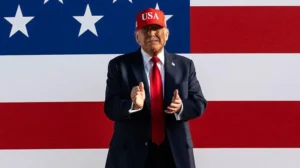Trump Warns of Extra 10% Tariff on Nations Supporting BRICS Policies

U.S. President Donald Trump has issued a stern warning that any nation aligning with the BRICS alliance in opposition to U.S. interests will face an additional 10% tariff.
“Any country aligning themselves with the Anti-American policies of BRICS will be charged an ADDITIONAL 10% tariff. There will be no exceptions to this policy,” Trump stated via social media.
Trump has been a vocal critic of BRICS — a bloc originally made up of Brazil, Russia, India, China, and South Africa, and now expanded to include Egypt, Ethiopia, Indonesia, Iran, Saudi Arabia, and the UAE. The group represents over half the world’s population and aims to elevate members’ global influence and challenge the dominance of the U.S. and Western Europe.
The U.S. had set a deadline of July 9 for countries to finalize trade agreements, but officials now confirm that new tariffs will take effect on August 1. Trump mentioned he would be sending formal letters to nations, detailing their specific tariff rates should no agreement be reached.
Since taking office in January, Trump has introduced a wave of tariffs on imported goods, arguing that they are necessary to protect American manufacturing and employment. On “Liberation Day” in April, he announced sweeping new taxes — some as high as 50% — though he temporarily suspended the most severe measures to allow for negotiations until July 9. During this period, a 10% tariff was imposed on imports from most international partners.
So far, the U.S. has concluded trade deals with the UK and Vietnam, and reached a partial agreement with China. The UK deal reduces tariffs on cars and parts from 27.5% to 10% for up to 100,000 vehicles annually and eliminates duties on aerospace products. In return, the UK removed import taxes on U.S. ethanol and beef.
The Vietnam agreement imposes a 20% tax on Vietnamese exports to the U.S., while U.S. goods sent to Vietnam will face no tariffs. However, products rerouted through Vietnam from third-party countries will incur a 40% tax.
Under the partial deal with China, the U.S. reduced tariffs on certain Chinese goods from 145% to 30%, and China cut its tariffs on American products from 125% to 10%, also eliminating some non-tariff restrictions, including bans on critical mineral exports.
Despite these moves, key issues remain unresolved. For instance, the U.S. and UK have yet to agree on steel import duties, and countries such as Japan and the EU face looming tariff hikes if deals aren’t reached soon. Trump recently warned Japan it could face tariffs as high as 30–35% if it fails to reach an agreement by Wednesday, while the EU has been told it may be hit with 50% tariffs unless progress is made.
The latest tensions arise after BRICS finance ministers, meeting in Rio de Janeiro, condemned U.S. tariffs and proposed reforms to the International Monetary Fund and global currency valuation systems. They warned that protectionist policies like tariffs destabilize the world economy and create uncertainty in global trade.
Trump’s new warning comes after BRICS criticized U.S. policies and suggested moving forward with a separate currency to rival the U.S. dollar — a move Trump previously threatened to counter with 100% tariffs in 2024.
Andrew Wilson, Deputy Secretary General of the International Chambers of Commerce, noted the difficulty for countries to pivot away from economic ties with China, citing its dominance in key sectors like electric vehicles, battery production, and rare earth materials. “Shifting away from China… is far more difficult to achieve in practice,” he told the BBC.
